- Home
- Courtney Milan
After the Wedding Page 2
After the Wedding Read online
Page 2
Three of his brothers had perished. Grayson had left looking like Adrian, and he’d come back like this—hard and untrusting, with a haunted look in his eye when he thought Adrian wasn’t looking.
Now Grayson reached across the table and took hold of the telegram without asking. He read it with a curl in his lip before tossing it aside. “Denmore would ask you for your heart without paying a half-penny to say please. Whatever it is he wants of you? You don’t need to give it.”
“I’m a grown man. I don’t need to do anything.”
Grayson looked into Adrian’s eyes across the table. There it was—that look, that sense Adrian had harbored for years that his brother had lost himself, and still needed to be found.
After a moment, his brother sighed. “You’re going anyway. I don’t want you to be hurt.” Grayson looked away. “I just want to…”
Protect you, he didn’t say, but Adrian could fill in the end of the sentence. Grayson had always looked out for him.
If it had just been himself remaining of his family, maybe Adrian wouldn’t have gone. He knew, after all, what his uncle was. Hell, he had spent most of his years in England. He wasn’t a gentle artist’s soul, no matter what Grayson thought. It could be a hard, ugly world, especially for black men.
Adrian had been spared the worst of it; he knew that. That made him feel more of an obligation, not less.
“You don’t need to look out for me,” Adrian said mildly.
Grayson shook his head, smiling. “Shut up, sprout. That’s my job. Don’t you have work, in any event?”
Adrian had too much to do. He’d already put off his return too long; after Grayson left England this time, Adrian wouldn’t see him for years to come.
Every worker at Harvil Industries depended on their continuing success. If they hadn’t started producing plates in a month…
“Say no,” Grayson said. “You don’t have time. God knows you’ve frittered enough of it away, staying with me while I oversee the cable-laying contracts. You know Denmore.”
Adrian did.
His uncle was flawed and self-centered, occasionally…but good still. Human, in other words.
And Adrian knew Grayson—knew the scars he bore on his soul, the ones he refused to talk about.
“Don’t worry,” Adrian said, with a half-smile. “I can take care of myself.”
Protecting an older brother was dangerous work. Grayson would never allow it, if he knew Adrian was attempting it. That just meant he needed to be all the more diligent about it.
Adrian had been lucky—so lucky. He had lived. He’d been deemed too young to go to war. He’d had every advantage. Every time he thought maybe I shouldn’t, or maybe I don’t have the time, he reminded himself how much he had. He always asked himself if maybe, he could take on a little more.
He always came to the same conclusion—yes, he could manage more.
Adrian could trust a little, could show his brother that he could loosen his hold on that hard knot of his suspicions. Their uncle was human, but he was a good man at heart. And maybe, if Adrian kept trusting…maybe one day he’d see Grayson smile the way he had used to.
Grayson just sighed. “Well. When he pretends he doesn’t know you a second time, you’ll undoubtedly be too upset for me to chastise properly. So I’ll say now what I won’t say then: He’s already shown his true colors. What he did was unforgivable, and I can’t believe you’re giving him a —what is it now?—a fourth chance. I told you so. You should have listened.”
“Mmm.” Adrian nodded. “I’ll save my speech for when we know the outcome.”
Grayson just shook his head. “Take care of yourself, little brother. I love you.”
“I love you, too.” Adrian stood. He reached out and set his hand on his brother’s shoulder. A little more, he thought. He couldn’t protect Grayson outright, but he’d trust where his brother couldn’t. He’d trust a little more, and hopefully that would help.
* * *
“Mr. Adrian Hunter to see you, my lord.”
All the reassuring words Adrian had spoken to his brother earlier that day were not enough to suppress his sense of disquiet at that introduction. The footman who conducted Adrian to the many-windowed room on the third floor overlooking his uncle’s grounds no doubt thought nothing wrong with what he’d said; it was, after all, the truth.
Just not all of it.
Adrian had visited his uncle for months at a time, starting when he was fifteen. It had not been a planned sojourn; war had broken out back in America, and his entire family had been determined to help. Adrian had been deemed too young to fight. His father had told him that his part in the war effort would be to keep the portions of the family business that were in England running smoothly.
His mother had given him another task. “Your charge is just as important,” she had told him before she had boarded the ship. “Your uncle is a respected man; if you can change his mind, it will make a difference.”
It had not been just as important, he had later realized; his parents had wanted to make sure that at least one of their sons survived the conflict. Boys his age and younger had fought. It had all been a lie to keep him from doing anything stupid, like trying to join his brothers as they blockaded Confederate forces.
During those years in England, Adrian had visited his uncle. Denmore, the Bishop of Gainshire, had been unerringly kind in private. In private, he’d talked lovingly of Adrian’s mother—his favorite sister, the sister whose loss he still mourned. In private, Adrian had asked why Denmore thought he had lost his sister when she was still alive and willing to speak to him, and had listened to the frank response.
His uncle had provided Adrian with some incredibly valuable lessons in how English society functioned.
One of those lessons was that being married to the wrong person was worse than being dead. Adrian hated it, but society wasn’t kind, and his uncle hadn’t tried to soften the blow. He’d taught Adrian to argue, to think, and to understand how the English thought in turn.
He’d cried and hugged Adrian when Adrian, impatient and determined, had left his uncle’s estate in order to take over his father’s bewildering responsibilities at Harvil; he’d embraced him every time he returned.
All that loving affection had happened in private.
In public, Adrian had been presented to all and sundry as first his uncle’s sometime page, then his part-time amanuensis.
In the seven years since Adrian had first visited his uncle, Denmore had never so much as mentioned their familial relationship in public. He had not let his own servants know the truth—not by so much as a flicker of a smile in their presence.
It had been thirteen months since they had last seen each other, and still his uncle let no spark of joy light his expression at the sight of his nephew. He did not rise from his desk; that would break his public façade.
Bishop Denmore would not show such affection for a man who had been a mere page.
Instead, he inclined his head. “Mr. Hunter,” he said calmly. “Do come in. It’s very good to see you. I’ll be with you in a moment.”
The footman was still present; Adrian stood stiffly beside the door. He could hear Grayson’s admonition in his head.
He’s going to hurt you.
Of course he was. Denmore annoyed Adrian every time they met by pretending they were not uncle and nephew. But Adrian could handle a little hurt if it eventually led to progress.
For now, he inclined his head.
“Bishop,” he said instead.
“Come, Mr. Hunter.” His uncle raised an eyebrow. “After our long acquaintance, we need not stand on such ceremony. Call me Denmore and be done with it.”
Beside Adrian, the footman shifted uncomfortably.
The request was a mark of familiarity. It would seem a kindness, an extraordinary condescension from a man of such exalted rank to a mere servant. The footman—his name was Walter Evans—believed Adrian didn’t deserve such respect.
> Adrian knew this because he’d said so, repeatedly.
Know your place, Adrian had been admonished when he was younger. Don’t take advantage of the charity of a good man.
“As you say, Bishop,” Adrian said.
Denmore sighed. “Well, Evans. Close the door behind you. We’ve business to discuss.”
Adrian and the bishop remained in place, a stiff, awkward ten feet distant. They waited until the door closed behind Evans, until they heard the servant’s footsteps receding in the distance.
Then, and only then did the bishop stand. He crossed the room and pulled Adrian into an embrace. “Adrian,” he said. “It’s been too long.”
It had been more than a year, and it had been a long year.
Bishop Denmore was almost a head shorter than Adrian; his wispy hair was white and textureless. His skin was paper-pale and creased with age, and he moved gingerly, evidence of his gout.
It was hard to believe they were related.
The bishop released him to an arm’s length. “You’re looking well, my boy.”
Adrian felt the corner of his mouth twitch. “I’m twenty-two. I’m hardly a boy.”
“No.” Denmore let go of his shoulders and gave him another appraising look. “No, you are not. You’ve grown to be so much more.”
Knowing they were uncle and nephew, not employer and employed, had left a mark. Denmore had pretended not to know Adrian when they met by chance at an exhibition a year ago. He had, in fact made an elaborate inquiry as to how a man like him had come to run a china-works near Bristol, so that the friend who accompanied him would not guess at their relationship.
The next time Adrian visited, he had given his uncle an ultimatum.
“Someday,” his uncle had said sadly. “I will. I promise.”
Someday had not yet arrived.
The bishop turned away. “You’ve arrived not a moment too soon. You always seem to know precisely when I need you.”
“That would be because you asked me to come.”
Over the last year, Adrian had had ample time to consider his situation in life. He knew how lucky he was. His family had money from their various business endeavors. His mother had inherited property, which had been added to his great-great-uncles’ holdings.
Adrian had a loving, overbearing brother and a massive extended family.
He didn’t need Denmore, not for anything.
Still, he had asked Denmore for that one thing, and he’d asked for it repeatedly. He’d asked when he was fifteen, and when he was sixteen, and again and again for years and years. His uncle had never said no; he had always said later. Not now.
Not now, not with the war in America still raging. Not now; Denmore needed time to bring his older brother, the duke, into the scheme. Not now; Denmore was being considered for elevation to bishop, and he could do so much more once he was appointed.
Not now; he was too new in his position; he did not dare make waves.
Not now, not now. But…someday. Someday, he had promised. Of course the time would come someday.
“So,” Adrian said, eyeing his uncle. “Last time we talked, I asked you to acknowledge my family. My mother, me, my brother. Is it time yet?”
His uncle smiled slowly. “It’s time.”
Oh, thank God. Adrian could just imagine the look on Grayson’s face when he brought this news back. He could not hold back his delighted smile; he felt as if his whole face would crack with joy. He hadn’t precisely been estranged from his uncle this last year over this very issue, but he’d pulled back. He hadn’t visited. His letters had been a little cold. He hated being cold.
“I always said the time would come,” his uncle said, patting Adrian’s hand. “I always said I would acknowledge you one day, and never mind the consequences. You know I love you, do you not?”
Adrian’s nose twitched on that word: consequences. They hadn’t really argued about consequences last time.
When he’d been his uncle’s amanuensis-slash-nephew–in–hiding, he had needed to construct arguments in letters on his uncle’s behalf. Denmore had taught him to hide his passion behind rational argument. Adrian always tried to meet people on the ground they knew best. Last time Adrian had met his uncle, they had debated the matter as if it were a question set before Parliament and they were indifferent observers hashing out the benefits and detriments.
“So.” Adrian folded his arms. He imagined the rationality his uncle preferred settling over his shoulders like a cloak, hiding the furious joy that threatened to break through his calm. “How have you planned the announcement? Have you consulted with your brother the duke yet?”
“Ah…” Denmore blinked.
“Will you tell them that your sister did not perish, as your father claimed so many years ago?” Adrian had thought about this for so long; he had so many ideas as to how to proceed. “Or would you rather start by introducing my father and brother? I know you worry about the connection with trade, but the trade my family engages in is of a particularly honorable sort. My father is a respectable gentleman who has devoted his life to a just cause—”
“Adrian.”
Ah. He hadn’t sufficiently hidden his enthusiasm. Adrian bit back his excitement.
“There is no way to soften the blow our family’s reputation will suffer when the news is out,” his uncle said. “A duke’s daughter ran off with a black abolitionist thirty-five years ago. My father told everyone she was dead rather than admit the truth. It will be a scandal no matter how it’s announced.”
Adrian took a deep breath. No point getting angry at the truth, even if his own uncle was the one saying it in that way. Except…it was not entirely the truth.
“My mother did not run off,” Adrian said mildly. “My mother was a widow. It took my parents three years working together on the matter of abolition before they decided to marry, which they did—legally, properly.” Rational; that was the way to convince his uncle. “You of all people know it matters how an issue is presented. My mother married a man who cared about a cause. How does that pose a problem?”
“It won’t matter that they were married.”
“As for my father, he—”
“Nor that your father was a man of property.”
“That’s not the point.” Adrian lived in his own skin, damn it. His father could have been supreme emperor of the entire world for all that British society cared. The fact that his father was black would be a scandal, no matter how it was laid out. He knew that, but still—“I know it won’t matter to some people, but it should, and if we are to have any chance of changing the way things are, we must talk of my parents as people first.”
His uncle just looked at him briefly, then turned away.
From his uncle’s point of view, this must seem a frightening step. It hurt a little, that this man who had been so kind still saw Adrian as an object of fear and not just a nephew—but Adrian had been lucky in his life. He could handle a little more personal hurt, if it led to the right result. His uncle had agreed to acknowledge him, and that was a good step forward. Adrian could acknowledge the hurt once the joy had come.
“Very well, then. If you’ve decided to do it, then it’s a matter of accepting the consequences as inevitable. I suppose Lassiter is no longer a problem?”
Bishop Lassiter was his uncle’s rival in the church. He had been Denmore’s excuse for the last two years. There was no rivalry so bitter as one between two men equal in rank and seniority, who opposed each other on every principle.
Adrian’s uncle brightened. “I’m so glad you mentioned him. That’s the very thing I need to discuss with you. He won’t be a problem…soon.”
Adrian looked over. There was a light in his uncle’s eyes.
His uncle leaned in excitedly. “Do you by any chance recall that favor you did for me on accident several years ago?”
“No,” Adrian said swiftly. No, he wouldn’t do it, he meant, but his uncle took it as simple denial.
“When th
ose men took you for a servant and divulged those very embarrassing details in your presence. Well.” His uncle slipped a piece of paper across the table with a self-satisfied smile. “Here,” he said. “Lassiter is advertising for a valet.”
It took Adrian a moment to process those words. To understand what his uncle was asking him to do.
He shook his head. “Impossible.”
“I’ve taken the liberty of obtaining references on your behalf,” the man said, as if Adrian had spoken of a practical impossibility instead of the fact that his soul rebelled against the thought of entering service to spy on another man. “Lassiter won’t connect the letters to me at all. And there’s a fashion for black servants in London at the moment. Lassiter is vain enough to indulge.”
Adrian turned his head away as much as he could without being rude. “I could not possibly pose as a valet.”
“My Henry will give you tips,” his uncle said. “And you won’t need to fool Lassiter for long. You’re so bright—you’ll pick up anything you need to know in no time at all.”
“No. Absolutely not.”
“You don’t have faith in your own intelligence?”
“It’s not that. It’s this: I’m not a servant. And I really don’t like lying.”
“Of course you aren’t. I’m not asking you to be one. I’m just asking you to pose as one. Be rational about this, Adrian.”
Rational. It was always rationality with Denmore, and the word was only brought out when his uncle proposed something that left a bad taste in Adrian’s mouth.
“I have business that requires my attention,” Adrian said. It was not a lie. He had four weeks until production had to start on his series of plates, and there were still no designs.
“Isn’t Grayson around now? He can handle it.”
“Yes, but—” But Grayson has no artistic sense, Adrian didn’t say, because it was one thing to make fun of your brother to his face, and another entirely to do it to someone outside the immediate family. “But Grayson is only in England because he’s overseeing the final production of the cable-laying ship and securing the contracts for the business to proceed. He hasn’t time to handle what is going on at Harvil, too.”

 Her Every Wish
Her Every Wish Midnight Scandals
Midnight Scandals After the Wedding
After the Wedding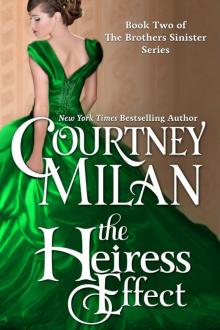 The Heiress Effect
The Heiress Effect Unraveled
Unraveled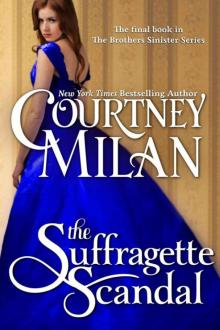 The Suffragette Scandal
The Suffragette Scandal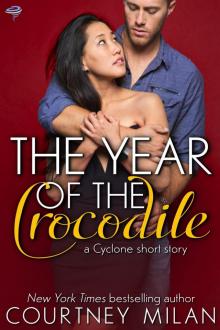 The Year of the Crocodile
The Year of the Crocodile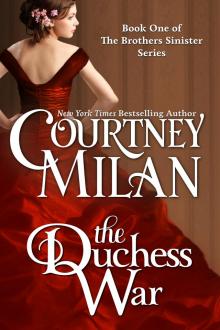 The Duchess War
The Duchess War What Happened at Midnight
What Happened at Midnight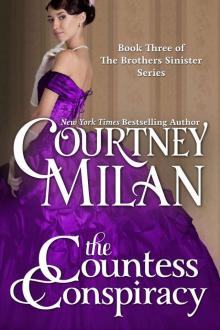 The Countess Conspiracy
The Countess Conspiracy Proof by Seduction
Proof by Seduction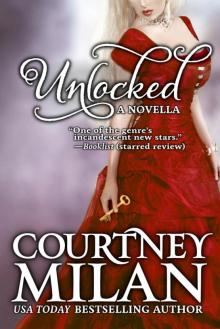 Unlocked
Unlocked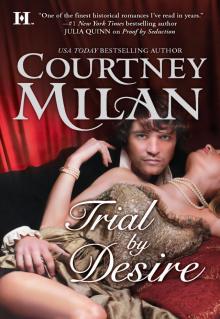 Trial by Desire
Trial by Desire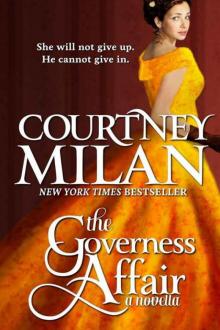 The Governess Affair
The Governess Affair Unveiled
Unveiled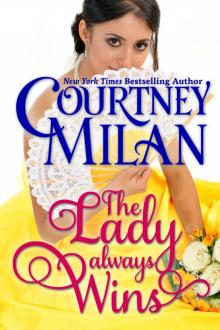 The Lady Always Wins
The Lady Always Wins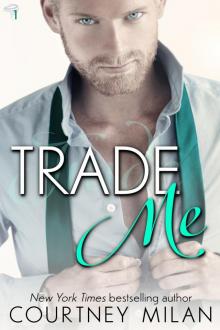 Trade Me
Trade Me Unclaimed
Unclaimed This Wicked Gift
This Wicked Gift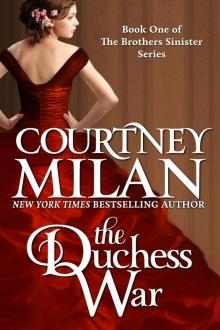 The Duchess War (The Brothers Sinister)
The Duchess War (The Brothers Sinister)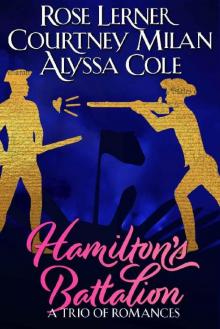 Hamilton's Battalion: A Trio of Romances
Hamilton's Battalion: A Trio of Romances The Turner Series
The Turner Series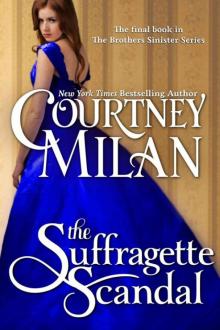 The Suffragette Scandal (The Brothers Sinister)
The Suffragette Scandal (The Brothers Sinister)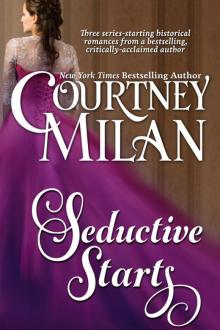 Seductive Starts
Seductive Starts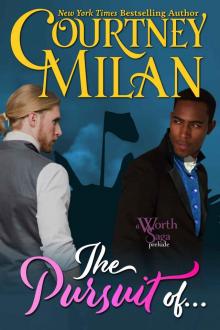 The Pursuit Of…
The Pursuit Of…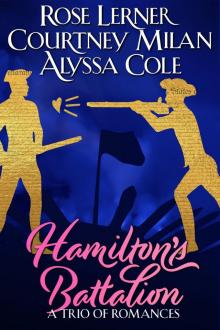 Hamilton's Battalion
Hamilton's Battalion The Carhart Series
The Carhart Series Seven Wicked Nights
Seven Wicked Nights This Wicked Gift (A Carhart Series Novella)
This Wicked Gift (A Carhart Series Novella)